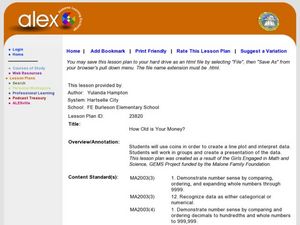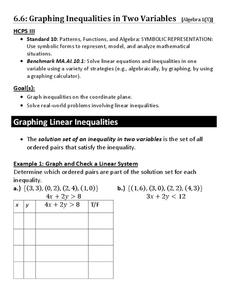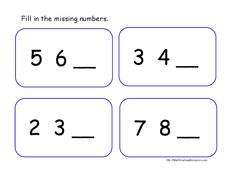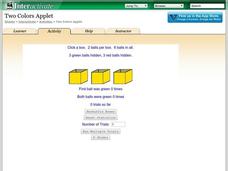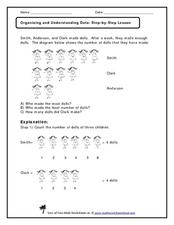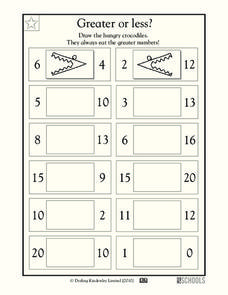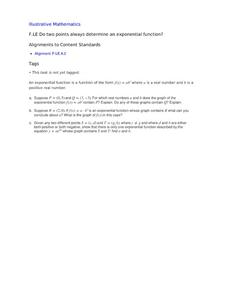Alabama Learning Exchange
How Old is Your Money?
Elementary learners explore coin mint dates. First, they listen to the book Alexander Who Used to be Rich Last Sunday by Judith Viorst. They then sort a collection of coins according to their mint date and put them in order from oldest...
EngageNY
End-of-Module Assessment Task: Grade 6 Math Module 3
The last installment of a 21-part module is an end-of-module assessment. Individuals show their understanding of positive and negative numbers on the number line, absolute value, and the coordinate plane in a variety of contexts.
Curated OER
Compare and Order Length
Learners examine four objects and identify each as longer or shorter than their hand. They order the four objects from shortest to longest and respond to a test prep question. A good worksheet for in-class work, or for a homework...
Computer Science Unplugged
Marching Orders—Programming Languages
Computers need precise directions to complete a task. Class members experience what it is like to program a computer with an activity that asks one pupil to describe an image while classmates follow the directions to duplicate the picture.
EngageNY
Integer Sequences—Should You Believe in Patterns?
Help your class discover possible patterns in a sequence of numbers and then write an equation with a lesson that covers sequence notation and function notation. Graphs are used to represent the number patterns.
Curated OER
Number Sense and Numeration: Square Roots
In this square roots instructional activity, 8th graders solve 14 different types of problems to include determining the square root of a number of problems, determining the area of a rectangle and the length of a side of a square with...
Illustrative Mathematics
Field Day Scarcity
Introduce young mathematicians to concepts of financial literacy with this open-ended word problem. With seven dollars to spend during field day and given a list of available items and their prices, children must determine how they want...
Buffalo State
A Five Day Approach to Using Technology and Manipulatives to Explore Area and Perimeter
Young mathematicians build an understanding of area and perimeter with their own two hands in a series of interactive geometry lessons. Through the use of different math manipulatives, children investigate the properties of...
EngageNY
Relationships Between Two Numerical Variables
Is there another way to view whether the data is linear or not? Class members work alone and in pairs to create scatter plots in order to determine whether there is a linear pattern or not. The exit ticket provides a quick way to...
Curated OER
Graphing Inequalities in Two Variables
This study guide is a great resource to help you present the steps to graphing linear inequalities. Show your class two different ways to graph an inequality and work on a real-world example together. The document could also be easily...
Curated OER
Fill in the Missing Numbers
What comes next? Drill your new counters as they fill in a blank space when given two consecutive numbers. Each page features four sets of numbers, and learners fill in the third of the series. Differentiate by having beginners fill in...
Math Worksheets 4 Kids
Translation Worksheet
For this translation worksheet, pupils translate points according to given expressions. They plot points on a coordinate plane. This two-page worksheet contains five problems. Answers are provided on the last page.
Notebooking Fairy
Timeline
Four different timeline graphic organizers are included here. The first has six boxes, the second eight, and the third and fourth ten in slightly different formats. Each page includes space to write in a title or other information, such...
Curated OER
Mass Lesson
It's not just a slideshow, it's a lesson on mass. First, learners complete a mental math warm-up, where they determine the number before and after a series of given numbers, then they form groups to weigh packages and compare mass....
Curated OER
Pick A Number
Elementary schoolers find out which month has the most class birthdays (mode) and which birthday represents the middle point of all the birthdays (median). They gather and organize data to find one number that fairly represents the whole...
Curated OER
Where We Live
Who has the most? Young learners practice charting data using familiar information. They help fill out a classroom chart by recording the number of people, pets, televisions, etc. in their home. Guiding questions help them investigate...
Balanced Assessment
Local and Global Behavior
Create rules for numerical sequences. Pupils develop local rules and recursive rules for number sequences. The sequences are linear, quadratic, and cubic in nature. Scholars find that some local rules do not work, no matter where in...
Teach Engineering
New Perspectives: Two-Axis Rotation
Two-axis rotations ... twice the fun as one-axis rotations! The last installment of a five-part module teaches scholars how to conduct two-axis rotations. They create isometric drawings before and after the rotations.
Shodor Education Foundation
Two Colors Applet
Find the box with two green balls. The applet uses six balls, three green and three red, and hides them in three boxes. Pupils choose a box and click on it to reveal the color of balls inside. Using the chosen box, the simulation keeps...
Curated OER
Organizing and Understanding, Step-by-Step
Use this number comparison and counting worksheet as an overhead projection for the whole class, because the answer is explained on the bottom half of the sheet. Cover the answer and reveal it once learners have tried it themselves. They...
Curated OER
Greater or Less?
These crocodiles are hungry for the biggest numbers they can find! This is a fun way to illustrate number comparison; use crocodile mouths as the greater than and less than symbols. There are two examples (with teeth...
Illustrative Mathematics
Traffic Jam
Help your learners understand dividing with fractions by using these methods to solve. Chose from two different number lines or linker cubes. This practices "how many groups?" style division problems which help them comprehend why...
Illustrative Mathematics
Do Two Points Always Determine a Linear Function?
Your learners can approach this task algebraically, geometrically, or both. They analyze the building of a linear function given two points and expand the concrete approach to the abstract when they are asked to find the general form of...
Curated OER
Do Two Points Always Determine an Exponential Function?
Algebra learners explore, analyze and build an exponential equation given its form and a specific point that exists on the function in this task. The last question asks learners to apply their ideas to an exponential equation given two...
Other popular searches
- Ordering Rational Numbers
- Ordering Whole Numbers
- Ordering Decimal Numbers
- Ordering and Comparing Numbers
- Math Ordering Whole Numbers
- Ordering Two Digit Numbers
- Ordering Three Numbers
- Ordering Two Digit Numbers
- Ordering 3 Digit Numbers
- Ordering Real Numbers
- Ordering Mixed Numbers
- Ordering Greater Numbers
